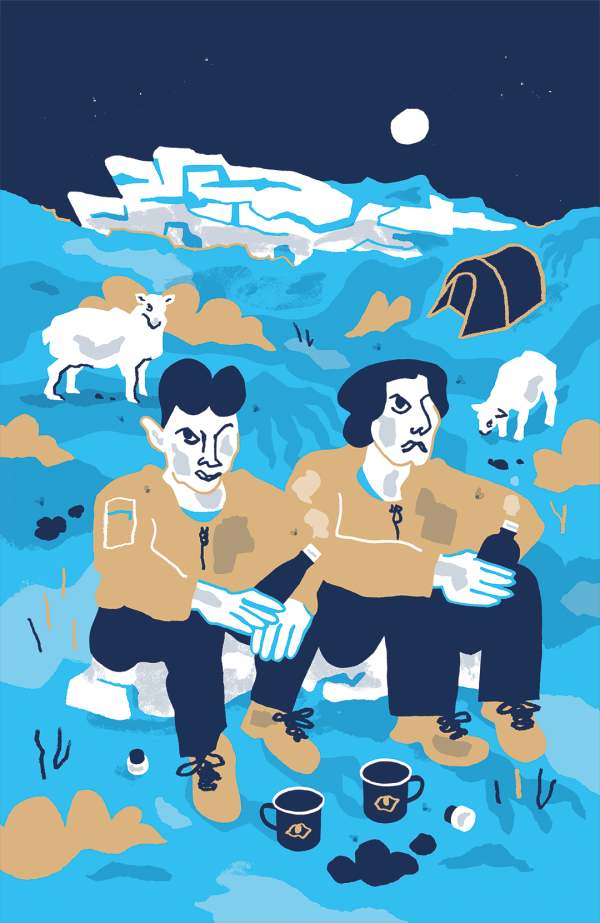Just over a year ago we published Dark Mountain: Issue 25, an anthology inspired by a struggle over access to land: a multimillionare landowner had successfully managed to remove the right to wild camp on Dartmoor, until then the only place in England where it was legal to do so. This prompted a wave of protest and galvanised a movement. The case reached the UK's Supreme Court, and last week, on the 21st May, the court ruled in the protestors' favour. It confirmed that the right to sleep under the stars in the Dartmoor National Park, enjoyed by generations of walkers, was enshrined in law.
To celebrate this victory, we bring you a piece by Robert Sherman that explores the bizarre legal debate at the heart of this: does sleep count as 'recreation'? Where does the night start? Accompanied by an original illustration by Phil Trenerry that plays with the ambiguity of how wild campers are often perceived: 'shadow walkers' lurking in the margins of landowners' imaginations.

In the darkening hollows of the hut circles?
Under the heels of all those boots; all those thousands of tiny, second-long sunsets?
*
IT WAS THAT GENTEEL, deadly-serious sort of activism that we seem to manage perfectly in Britain: marching to nowhere and protesting to nobody.
In early 2023 thousands of angry, happy people found their way onto the emptiness of the Dartmoor National Park in southwest England to assert their right to camp without landowners’ permission. There was no opposing army to meet them; just that bottomless wind, and the absent presence of one of the land’s legal owners. His claims against wild camping, and the counterclaims of the protesters, have fed battles in the national courts and an emotive stalemate that has only just been broken, two years later.
For my family, the stories about that day on the moor are already fading into a comfortable fable; a self-congratulatory anecdote about how we had tried and failed to be there. My partner, my infant son and I waited in line to be shuttled into Stall Moor, in one of the organised minibuses nosing up through the lanes from the town of Ivybridge. After three hours our small boy was getting groggy in the new year sunshine, fascinated by his blueing hands. Nowhere near the front of the queue we gave up, embarrassed, our planned banner unwritten in the boot of the car:
THIS DEMON EATS LANDLORDS
We saw the pictures online, and felt jealous and pathetic not to have been part of this new legend; and the event had all the furniture necessary to become legendary. The stamping and rattling to the skylarks, the speeches on the stones; the effigy of the moor's guardian spirit, Old Crockern, unfolded like a hired magician at a birthday party to bring hubris to the greedy.
Performing such a ritual on a part of the moor owned by Alexander Darwall, the financier who had challenged the presumptive camping rights in the first place, was no accident; and after the Supreme and High Court sessions that followed, by which rights to camp have been retained, we all congratulated ourselves on the power inherent in folklore. Here was a little bit of English banishment, paying off.
*
Between the flight feathers of the gull sat on Ugborough, absolutely nowhere near a sea: wings shuffled behind its back like cards?
Under the pigeon’s snugness, nesting behind the pub's security lights?
*
Despite all of the publicity we (they) generated, of course in the end the protesters’ magical thinking had little to do with it. The defence of wild camping was made in the London courtrooms by lawyers beating the bounds of the bye-law. Law is language, and language becomes law: and when that language is disputed, any connection to ground truth becomes incidental.
This great Battle of Dartmoor is already being compared, daringly, to the 1932 mass trespass on Kinder Scout in Derbyshire, in which hundreds scuffled with gamekeepers to demand access to the uplands until then kept sacrosanct for grouse shoots. The comparison, however, can be extended to the legend-making of these events themselves. The Kinder Trespass contributed to the paperwork of the 1949 National Parks Act, even if it wasn’t the whole cause; and the summoning of Crockern on Dartmoor two years ago was paralleled by courtroom negotiations two hundred miles east, talking over the protester’s songs, rather than echoing them; the sound of well-fed voices disputing a very fundamental fence-line.
In the scant 20-page PDF of the High Court's judgement on Darwall’s case, you can feel the parentheses in those voices. They are careful, testing the tensile strength of the argument, the neighbourly disagreement between shadow and light, open and closed air; the boundaries that separate them being only thin canvas and thin ideology:
If that walker keeps his eyes open and remains awake, the pastime he is enjoying may include simply resting in the open-air in the peace of the countryside. I have then asked myself whether it makes any difference if the putative walker falls off to sleep. The only argument suggesting it might is that recreation is something one does when one is awake and sentient.
While the main question in the judgement seems to be whether an enclosed tent precludes wild camping from being considered ‘open-air’ recreation (and thus protected by the by-law), the question of sleep itself is also under scrutiny. Is sleep recreation? Where, legally, does one's presence on the moor stray from welcome to unacceptable. What is the precise picosecond when that welcome turns sour?




